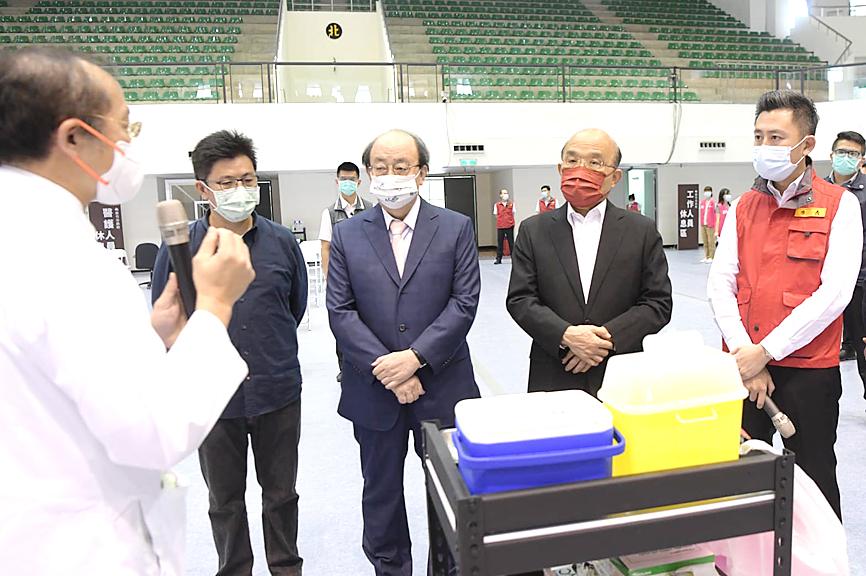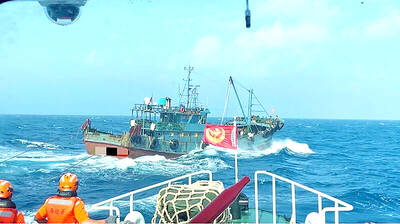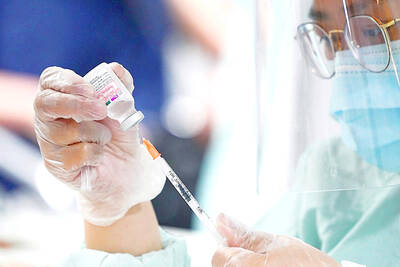The Central Epidemic Command Center (CECC) yesterday reported 47 domestic cases of COVID-19 infection, three imported cases and 13 deaths, and said that it would compile industry-specific disease prevention guidelines as the nation works toward an easing of restrictions.
Of the local infections, 22 are male and 25 female, with an onset of symptoms between Tuesday last week and Wednesday, the center said.
New Taipei City recorded the most local transmissions, with 20 cases, followed by Taipei with 18 cases, Taoyuan with five, Kaohsiung with two, and Hsinchu city and county with one each, the center said.

Photo: Screen grab from Facebook
Twenty-eight of the local cases had known sources of infection, three had unclear links with other cases and 16 were under investigation, it said.
The imported cases were two Indonesian fishermen and a Philippine fisherman, the center said.
The Indonesians, in their 20s and 30s, were on a boat that returned to Taiwan on June 16, it said, adding that they were tested for COVID-19 on Tuesday before completing their quarantine period.
The Filipino, in his 30s, checked into a quarantine hotel on June 16 to isolate himself after a fisher on his boat tested positive for COVID-19, the center said, adding that he was tested on Tuesday before completing his isolation period.
No contact tracing was necessary for the fishers, it added.
The 13 deaths occurred between June 17 and Wednesday, the center said, adding that the seven men and six women aged 50 to 89 had underlying health conditions and symptoms that started between May 14 and June 18.
As of yesterday, Taiwan had a total of 14,853 confirmed COVID-19 cases — 1,175 imported and 13,625 domestic — with 661 deaths, CECC data showed.
Of the total, 13,549 cases were confirmed between May 11 and Tuesday, while 10,306 cases, or 76.1 percent, have been released from isolation, the center said.
The center would compile disease prevention guidelines specific to certain industries, especially how businesses should respond if employees test positive, Minister of Health and Welfare Chen Shih-chung (陳時中), who heads the CECC, told a daily news briefing in Taipei.
The food and beverage industry — including restaurants and night markets — would be among those to receive updated instructions, he said.
The guidelines would aim to prepare for a potential easing of restrictions after July 12, he said.
A decision on lowering the nationwide level 3 pandemic alert would depend on whether the overall COVID-19 situation is under control, Chen said.
Over the past few weeks, about 0.1 to 0.2 percent of the polymerase chain reaction (PCR) tests conducted have returned positive for COVID-19, said Centers for Disease Control Deputy Director-General Philip Lo (羅一鈞), who is deputy head of the CECC’s medical response division.
About 30,000 PCR tests are being conducted daily, he said, adding that the nation has the capacity to conduct up to 120,000 tests per day.
As of Wednesday, 2,043,218 COVID-19 vaccine doses had been administered — 2,001,418 first doses and 41,800 second doses, CECC data showed.
The nation’s COVID-19 vaccine coverage is about 8.52 percent, the center said.

MILITARY BOOST: The procurement was planned after Washington recommended that Taiwan increase its stock of air defense missiles, a defense official said yesterday Taiwan is planning to order an additional four PAC-3 MSE systems and up to 500 missiles in response to an increasing number of missile sites on China’s east coast, a defense official said yesterday. The official, who spoke on condition of anonymity, said that the proposed order would be placed using the defense procurement special budget, adding that about NT$1 trillion (US$32,88 billion) has been allocated for the budget. The proposed acquisition would include launchers, missiles, and a lower tier air and missile defense radar system, they said The procurement was planned after the US military recommended that Taiwan increase

POLITICAL AGENDA: Beijing’s cross-strait Mid-Autumn Festival events are part of a ‘cultural united front’ aimed at promoting unification with Taiwan, academics said Local authorities in China have been inviting Taiwanese to participate in cross-strait Mid-Autumn Festival celebrations centered around ideals of “family and nation,” a move Taiwanese academics said politicizes the holiday to promote the idea of “one family” across the Taiwan Strait. Sources said that China’s Fujian Provincial Government is organizing about 20 cross-strait-themed events in cities including Quanzhou, Nanping, Sanming and Zhangzhou. In Zhangzhou, a festival scheduled for Wednesday is to showcase Minnan-language songs and budaixi (布袋戲) glove puppetry to highlight cultural similarities between Taiwan and the region. Elsewhere, Jiangsu Province is hosting more than 10 similar celebrations in Taizhou, Changzhou, Suzhou,

COGNITIVE WARFARE: Chinese fishing boats transmitting fake identification signals are meant to test Taiwan’s responses to different kinds of perceived incursions, a report said Chinese vessels are transmitting fake signals in Taiwan’s waters as a form of cognitive warfare, testing Taipei’s responses to various types of incursions, a report by the Institute for the Study of War said on Friday. Several Chinese fishing vessels transmitted fake automatic identification system (AIS) signals in Taiwan’s waters last month, with one mimicking a Russian warship and another impersonating a Chinese law enforcement vessel, the report said. Citing data from Starboard Maritime Intelligence, the report said that throughout August and last month, the Chinese fishing boat Minshiyu 06718 (閩獅漁06718) sailed through the Taiwan Strait while intermittently transmitting its own AIS

CHINESE INFILTRATION: Medical logistics is a lifeline during wartime and the reported CCP links of a major logistics company present a national security threat, an expert said The government would bolster its security check system to prevent China from infiltrating the nation’s medical cold chain, a national security official said yesterday. The official, who wished to stay anonymous, made the remarks after the Chinese-language magazine Mirror Media (鏡周刊) reported that Pharma Logistics (嘉里醫藥物流) is in charge of the medical logistics of about half of the nation’s major hospitals, including National Taiwan University Hospital and Taipei Veterans General Hospital. The company’s parent, Kerry TJ Logistics Co (嘉里大榮物流), is associated with the National Committee of the Chinese People’s Political Consultative Conference (CPPCC) and the Chinese People’s Liberation Army (PLA), the